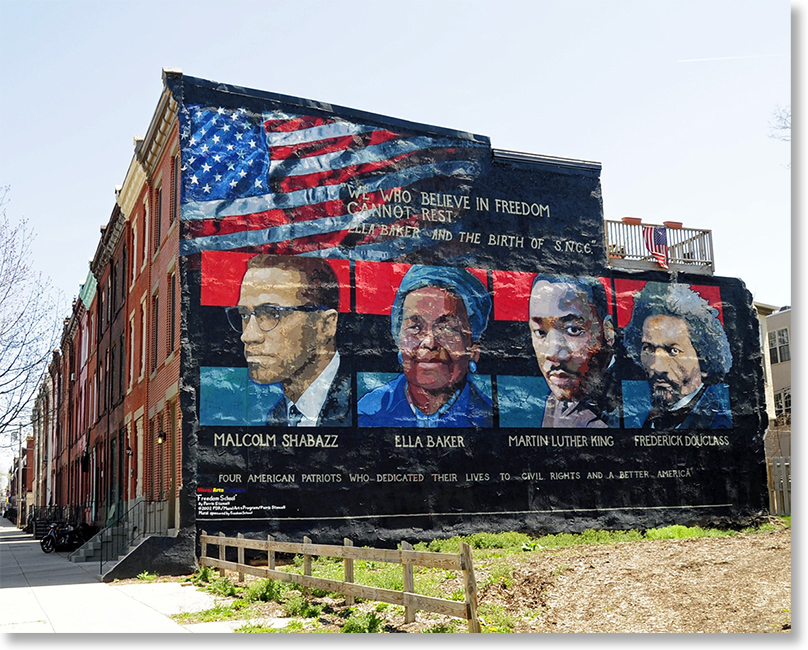|
Ella Baker Legacy Energizes
Movement for Black Lives by Paul Rockwell Oakland, California
In a recent talk, Cornel West said: “There is no civil rights movement without the witness and example of Ella Baker." Ella Baker, however, has yet to receive full, mainstream public recognition for her contribution to American democracy, especially the co-founding and guidance of the most effective, innovative civil rights organization of the 20th century, the Student Non-violent Coordinating Committee -- SNCC. While it is true that the media demonizes Malcolm X and sanitizes Dr. King, Ella Baker, a Black woman, is simply ignored. In her new book, FROM #BLACKLIVESMATTER TO BLACK LIBERATION, Keeanga-Yamahtta Taylor writes: “Black women have been central to every significant campaign for Black rights and freedom. Ella Baker, Fannie Lou Hamer, Diane Nash ... were critical to the development of the civil rights movement, but that movement is still primarily known by its male leaders.” Ella Baker was three decades older (She was called a "middle-aged hell-raiser"), but young activists trusted her because she showed more confidence in the audacity and inventiveness of youth than in the expertise of established civil rights organizations. The students affectionately called her "Miss Baker" (though she was married). Her nickname was "Fundi," a Swahili term for a person who hands down skills and wisdom from one community to another. Baker defied stereotypes. She was a militant revolutionary who wore elegant hats and dressed as if she were attending church. The founding of SNCC at Shaw University in Raleigh, North Carolina, in 1960 changed the tone and direction of the civil rights movement. The conference, which drew hundreds of students from throughout the South, was tense. Male leaders in the Southern Christian Leadership Conference wanted to oversee the fledgling organization, to put SNCC under their control. Baker was the only woman to speak at the Plenary Session. She warned students against bureaucracy and co-optation. She insisted on the autonomy of the students, who had already demonstrated their brilliance and savvy tactics in the early sit-ins. "I knew that young people were the hope of any movement. It was just a normal thing to me," Baker said years later. Each generation offers a new lens through which to view the contours of the future. SNCC did not repudiate the legal battles of the past. It went beyond them. Baker’s democratic, grassroots practice permeated SNCC. By shifting the focus from appeals to the elite to organizing the disenfranchised and the poor, SNCC changed the center of gravity in the movement. Black communities were not helpless. They were ready to fight. Mississippi historian John Dittmer wrote: "Not since Reconstruction had anyone seriously proposed that illiterate sharecroppers had the same right to the franchise as did teachers, lawyers, and doctors." Mentored by Baker, SNCC turned away from charismatic, top-down leaders to group-centered leadership. And it put direct, mass action at the center of strategy. SNCC students organized new sit-ins at segregated facilities, carried out the historic freedom rides in the face of violence, and registered black voters in defiance of the Ku Klux Klan in rural Mississippi. SNCC’s assault on Jim Crow in the 60s did more to abolish the legal apparatus of white supremacy than years of well-financed legalistic and professionally run campaigns. SNCC’s influence extended far beyond black communities in the South. Tom Hayden participated in SNCC meetings and actions, and he saw "participatory democracy" in action before he wrote the SDS Port Huron Statement. In the SDS Bulletin he asked: "Can the methods of SNCC be applied to the North?" Baker’s Impact on Women in SNCC After Barbara Ransby published her comprehensive biography Ella Baker and the Black Liberation Movement in 2003, social activists intensified their community organizing and focused on the most marginalized sections of the American system. Ransby devotes an entire section to the role of women in SNCC. Baker’s legacy in Black Lives Matter Today’s Black Lives Matter movement draws extensively from the Black radical tradition, and the life of Ella Baker continues to swell the rolling waves of resistance to mass incarceration and state terror. Ransby’s extraordinary biography of Baker was followed by a host of radical black feminist books that moved Baker out of the dimly lit margins of the past to the center of the black liberation movement:
Baker is often quoted, not only in books, but in speeches, posters and banners in the recurrent uprisings against police murders. In Ferguson, one poster read: "Until the killing of black mothers’ sons is as important as the killing of white mothers’ sons, we who believe in freedom cannot rest." Youth chanted: "Ella Baker was a freedom fighter/ She taught us how to fight/ We gonna fight all day and night/ Until we get it right." Baker’s influence is especially prominent in the work of Charlene Carruthers, co-founder of the Black Youth Project 100 (BYP 100). She explains Baker’s most famous statement, "Strong people don’t need strong leaders." Despite the dark moments of our present era, Ella Baker’s light shines on the long walk to freedom.
|
||||||
| Published in In Motion Magazine February 21, 2019. |
||||||
If you have any thoughts on this or would like to contribute to an ongoing discussion in the  What is New? || Affirmative Action || Art Changes || Autonomy: Chiapas - California || Community Images || Education Rights || E-mail, Opinions and Discussion || En español || Essays from Ireland || Global Eyes || Healthcare || Human Rights/Civil Rights || Piri Thomas || Photo of the Week || QA: Interviews || Region || Rural America || Search || Donate || To be notified of new articles || Survey || In Motion Magazine's Store || In Motion Magazine Staff || In Unity Book of Photos || Links Around The World NPC Productions Copyright © 1995-2019 NPC Productions as a compilation. All Rights Reserved. |


